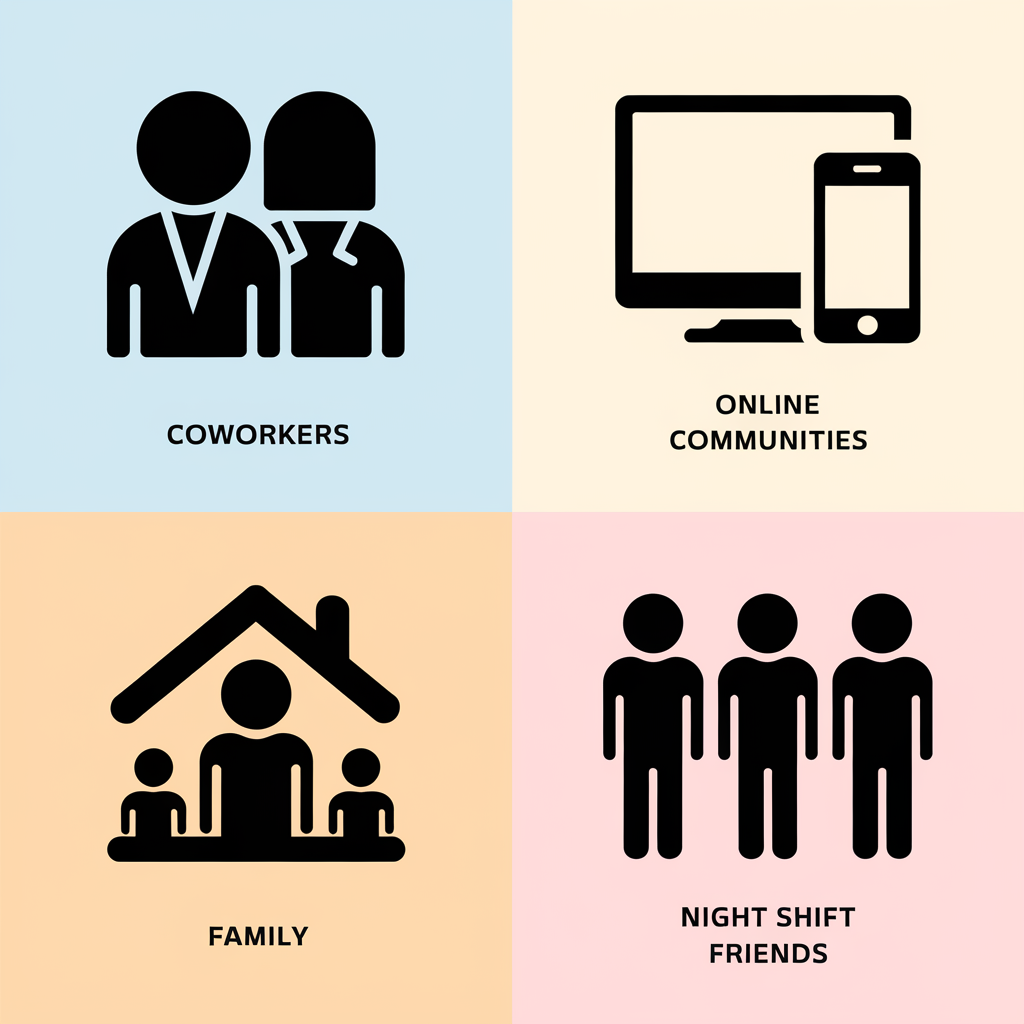How to Manage Your Relationships and Social Life as a Night Shift Worker
Working nights doesn’t mean your social life has to suffer. Discover practical strategies for maintaining relationships, finding community, and staying connected while working unconventional hours.

“Sorry, I can’t make it – I’ll be sleeping then.” If you work the night shift, you’ve probably said this more times than you can count. While the job comes with unique night shift social life challenges, staying connected with friends, family, and your community is not only possible but essential for your well-being. Let’s explore how to build and maintain a fulfilling night shift social life.
Common Social Challenges for Night Shift Social Life
Night shift workers often face a fundamental misalignment with the rest of the world. Traditional social events happen during our sleep hours, and the simple rhythm of daily life seems designed for everyone but you. Friends and family struggle to understand why you can’t “just stay up a little longer” or “get up at a reasonable time,” not realizing that these suggestions are like asking a day worker to attend an event at 3 AM.
These challenges typically include:
- Missing evening gatherings and weekend events
- Limited overlap with friends’ free time
- Difficulty participating in regular family routines
- Managing relationships when your most alert hours are others’ sleeping time
- Explaining your schedule constraints repeatedly to others
Researchers have even noted that working odd hours often leads to difficulties with personal relationships and disturbances to family and social life. A recent study confirmed this, finding three times as many night shift workers report social isolation compared to those on a typical schedule (pmc.ncbi.nlm.nih.gov).
The constant need to navigate the night shift social life can feel overwhelming, but understanding them is the first step to finding solutions. Let’s also recognize that you’re not alone in facing these obstacles, and there are proven strategies to help you maintain a fulfilling social life while working nights.
Family Connections
As a night shift worker, conventional routines rarely fit your schedule. Instead, you can grow successful family bonds by creating meaningful moments of connection. With thoughtful planning, you can create a routine that gets the most out of the minimal overlaps in your free time, leading to more focused and valuable family experiences. Even brief interactions can become cherished rituals that your family anticipates.

Help Them “Get” Your Schedule:
Gently educate your family about your sleep and work routine. Explain that when it’s noon for them, it might be like midnight for you. For example, you might say, “I’d love to join the 8 AM breakfast, but that’s my 8 PM. How about a dinner together on my day off instead?” By communicating your schedule, you set realistic expectations and hopefully gain some much-needed understanding from them.
Set Boundaries for Rest (Politely):
It’s okay to ask your family for support in protecting your sleep. Kindly let them know which hours you need quiet. “I have to sleep from 9 AM to 3 PM—could we save lawn mowing for later in the day?” Small requests like this prevent misunderstandings and show them it’s about health, not avoidance. When your loved ones know your needs, they’re more likely to respect them.
Plan Quality Family Time in Advance:
Since spontaneous hangouts are tough, plan ahead for important family events or routines. Mark your calendar for things you really don’t want to miss, like a cousin’s wedding or a child’s school play, and see if you can swap a shift or use a day off. Likewise, schedule regular family dinners or video calls on days you’re free. You might, for instance, declare that Sunday evening is family dinner night because you’re off that night. Planning ensures you’re present for key moments even if you can’t be there for everything.
Create New Traditions (Especially with Kids):
Find routines that fit your unique hours. Maybe you do a fun breakfast with the kids instead of bedtime stories, or you’re in charge of the early morning school drop-off before you sleep. Your family’s schedule might look different from others, and that’s okay. What matters is that your loved ones still feel you’re there for them, just sometimes at unusual times. By embracing your own family traditions (like a Monday afternoon board game or late-night movie with a sibling who’s a night owl too), you keep those bonds strong.
Transition times, those precious moments before and after your shift, often become the cornerstone of family connection. These natural opportunities for interaction can be transformed into special traditions that work for everyone.
Instead of trying to fit your family life into a traditional schedule, establish unique customs that work for you. Many night shift workers find that intentional approaches actually lead to deeper family bonds because time together becomes more deliberate and meaningful.
The goal isn’t to replicate traditional schedules but to create new patterns that work for your family. Focus on quality over quantity, and be intentional about making the most of your available time. Overall, it’s not about how many hours you spend together but how you use those precious moments to strengthen your family bonds.
Partner Relationships
Building and maintaining strong partner relationships while working nights presents unique challenges, but it can also create opportunities for deeper connection. When one of you is crawling into bed, the other might be just crawling out. Less face-to-face time, missed date nights, and opposite sleep schedules can all put a strain on your love life. In fact, studies have found that night shift work can seriously challenge marriages as one study even showed it may increase the risk of divorce by over 50% if the issues aren’t addressed (concentra.com).
Being on an opposite schedule from your partner means every shared moment becomes more precious and intentional. This heightened awareness can actually strengthen your bond as you both learn to value and maximize your time together. Creating consistent touchpoints throughout your different schedules can be a real difference-maker. These don’t have to be long periods – even short, meaningful interactions can help maintain your bond.

Communicate Openly and Often:
Honest communication is your lifeline. Talk about what’s working and what isn’t. If you’re feeling disconnected or missing your partner, say so gently. Encourage them to share their feelings too. Something as simple as, “I miss our time together. Can we plan something special on Saturday when I’m off?” can start a productive conversation. Also, use little check-ins to bridge the gap — a loving text during your break or a quick call before your partner’s bedtime can mean a lot. When both of you voice needs and concerns, you can tackle problems as a team rather than letting resentment build.
Prioritize “Us” Time (Even if it’s at Odd Hours):
You might not get the classic Friday date night, but you can create your own unique time slots for romance. Look for any overlapping free time and treat it as sacred. Maybe it’s sharing a quiet morning coffee date when you get home and they’re waking up, or an early evening dinner when they get home and before you have to go to work. Put these on the calendar like appointments. For example, if Wednesday 3 PM – 6 PM is open for you both, make it your time — go for a walk, watch a movie, or just catch up on the couch. Consistently dedicating time to each other (no matter the hour) keeps your bond strong.
Respect Each Other’s Sleep and Energy:
Both you and your partner need to value the other’s rest and commitments. This means if you’re the one working nights, try not to expect your partner to stay up until 3 AM just to spend time (unless they’re truly up for it). Conversely, if you’re the one home in the daytime, avoid waking your night-shifter for non-urgent things. Show that you care about them getting the sleep they need.
For instance, if your spouse is asleep when you get home, maybe leave a little love note on the pillow instead of waking them. And when you’re sleeping midday, make sure they know it’s important you’re not disturbed. Mutual respect here prevents a lot of friction. It also helps to coordinate on chores and responsibilities—maybe you handle grocery shopping at 8 AM after your shift, while your partner walks the dog in the evening. Working as a team according to who’s alert when can reduce stress for both of you.
Stay Connected Through Small Gestures:
When time together is limited, the little things keep the romance alive. Embrace creative ways to say “I love you” despite opposite schedules. Leave a goofy or sweet text for them to wake up to. If you leave for work while they’re asleep, give them a gentle kiss goodbye or set out their favorite snack. Share an online calendar for each other with notes like “💖 date with you” blocked out. These gestures show that even though your schedules clash, your partner is always on your mind.
Such acts can reassure a partner who might sometimes feel a bit lonely due to your night job. Remember, consistency matters more than grand events—regularly nurturing the connection in bite-sized ways goes a long way.
Relationship success on the night shift shouldn’t necessarily focus on trying to match one’s schedule over the other. Instead, it’s about finding creative ways to stay connected despite your different rhythms and night shift social life. Your days off become particularly important, serving as opportunities for deeper connection and shared experiences:
Many couples find that the extra effort required to maintain the connection while working opposite schedules actually strengthens their relationship, as both partners become more intentional about their time together.
Feeling the disconnect? Our Social Life Assistant for Night Shift Workers offers smart ways to reconnect with your partner — no matter the schedule.
Friendships & Night Shift Social Life
Friendships while working nights can require quite a different approach. While many think night workers can’t have an active night shift social life, the reality is that you can build deep, meaningful friendships – it just takes more intentional effort and clear communication from both sides. The strongest friendships often develop with those who respect and adapt to your schedule.
Communication becomes your most powerful tool. Being upfront about your schedule will help identify which friends are willing to adapt and be flexible.

Set Clear Expectations Around Night Shift Social Life
- Explain your schedule to close friends
- Suggest alternative meeting times that work for you
- Plan ahead for important social events
- Be honest about your sleep needs
- Let friends know your best contact hours
Be Upfront and Suggest Alternatives:
Let your friends know you still want to see them and explain the times you can hang out. If you get invited to a Friday 9 PM dinner (and you work that night), explain why you can’t go, but offer another option: “I work Friday night, but what if we do Saturday night instead?” When friends understand that you’re saying no to the timing, not to them, they’re more likely to accommodate and keep you in the loop. Don’t shy away from talking about your unusual hours—true friends will appreciate the honesty and effort to meet halfway.
Plan (and Initiate) Hangouts on Your Terms:
Since your free time is off-peak for others, sometimes you might need to be the planner. Take initiative to organize activities that fit your night shift social life. Maybe host a late-night movie marathon on one of your nights off, or plan a midweek afternoon picnic when you’re awake and others can take a break. You could even suggest a virtual game night after 11 PM for your fellow night-owl friends.
By being the organizer, you can set times that work for you, and your friends get to try something different. Planning ahead is key — if you know you’re off next Tuesday, invite people early so they can pencil it in. Creating the plans shows your pals that you do want to see them and makes your night shift social life thrive.
Make the Most of the Night Shift Social Life You Do Have:
When you finally align schedules with friends, prioritize that time and be fully present. You might not see them as often as you’d like, so treat those hangouts like gold. Put away your phone (unless you’re showing them funny memes from your night shift survival saga) and really engage. Focus on doing fun or meaningful things together rather than worrying about how long it’s been or how hard the night shift social life schedule is. Quality beats quantity.
For instance, even if you can only meet a friend for one hour during their lunch break, make that hour count with real conversation or something you both enjoy. Your genuine enthusiasm will shine through and keep the friendship strong, even if meetings are infrequent.
Stay Connected in Small Ways When Apart:
Just because you can’t attend every outing doesn’t mean you disappear from your friends’ lives. Use technology and creativity to stay in touch from afar. Leave a funny comment or a late-night message in the group chat (they’ll see it in the morning and know you were thinking of them). Share night shift social life updates or photos on social media when you’re on break at 3 AM – your friends will comment when they wake up. You can even schedule a quick video call with a close friend during a time you’re both free (maybe you chat with your bestie while you’re having your pre-shift dinner and they’re winding down for the night).
These little interactions show you still care. It keeps you present in your friends’ minds and maintains the sense of friendship, so when you do meet up, you don’t feel like strangers. Real-time connections through technology can very much help you stay involved with friends and family.

Real-Time Connection
- Schedule quick video calls during your breaks
- Join virtual family dinners or bedtime routines
- Use group video calls for special occasions
- Participate in online activities with friends during downtime
Sometimes, direct communication isn’t possible due to schedule conflicts. That’s where asynchronous communication becomes valuable, allowing you to maintain connections without requiring immediate responses:
Async Communication
- Send messages for people to wake up to
- Share photos or updates during your shift
- Use group chats to stay involved in conversations
- Leave digital notes or voice messages
Want more real-world tips? Watch our video How to Maintain Friendships as a Night Shift Worker for creative ways to stay connected — even with opposite schedules.
Building Your Night Shift Social Life Community
Night shift work presents an opportunity to connect with others who truly understand your lifestyle. One way to enrich your life is to connect with people who also live the night shift social life. They’ll inherently understand your schedule and challenges.
Consider joining online communities or forums for night shift workers, https://www.reddit.com/r/Nightshift/ is a great one, or make an effort to befriend a coworker or others who keep non-traditional hours. Having a few friends who are on the same schedule as you are of real benefit. You could meet up with a coworker after a shift for a 7 AM breakfast (when everyone else is stuck in rush hour), or have a friend to text at midnight who will reliably reply.
This doesn’t mean replacing your old friends, of course, but expanding your circle. A support network of fellow night shifters can help ease that isolation and give you more social outlets that fit your lifestyle. Plus, you can swap night shift life hacks while you’re at it!

Most good people in your life will understand your unique schedule. Focus on those who make an effort to accommodate your timing, and don’t feel guilty about saying no to events that conflict with your sleep schedule. The quality of your friendships matters more than the frequency of your social interactions.
Your workplace provides the first and most natural opportunity for building these connections. Night shift colleagues inherently understand the challenges you face because in most cases they’re living most closely to how you are too.

But your night shift community can extend far beyond your immediate workplace. There’s a whole world of night shift workers across different industries who share your schedule and lifestyle. These connections often evolve into valuable support systems that help you navigate the unique challenges of night shift work. By sharing resources and experiences, you can learn from others who’ve successfully adapted to the night shift lifestyle.
Being part of the night shift community can help you to have a group that understands and validates your experience. These connections can transform the potential isolation of night work into a sense of belonging to a unique and supportive community.
Need help finding new ways to connect? Try our tool: Ideas for Building Connections and Managing Loneliness While Working Nights for fresh, realistic strategies.
Balancing Social Life and Well-being Through Strategic Planning
When you work nights, a thriving social life doesn’t usually just happen by chance – like we keep mentioning, it requires thoughtful planning and intentional effort. Many night shift workers find that taking a strategic approach to social activities not only helps them maintain relationships but also protects their essential rest time. Success comes from finding the right balance between social connection and self-care.
Managing your precious time off becomes equally as important. Unlike day workers who might spontaneously accept social invitations, you may need to be more deliberate about how you spend your free time.
Perhaps most importantly, maintaining a healthy social life while working nights requires clear boundaries. Learning to protect your sleep schedule while staying socially connected is essential.

Successful social planning as a night worker isn’t about fitting into traditional schedules – it’s about creating new patterns that work for you and your loved ones. With thoughtful planning, you can maintain meaningful connections while still getting the rest you need.
Want to give back or stay involved without burning out? Our video Ways to Be Involved in Your Community With Limited Hours shares practical ideas that fit your schedule.
Tips for Night Shift Social Life Success
Before we wrap up, let’s review a few strategies that successful night shift workers consistently use to maintain fulfilling social lives. While everyone’s situation is unique, these core principles have proven effective across different schedules and lifestyles. They represent the foundation of maintaining strong social connections while working nights.
Key Strategies for a Sustainable Night Shift Social Life
- Be clear about your schedule needs
- Plan ahead for important events
- Find flexible friends who understand your lifestyle
- Use technology creatively to stay connected
- Create new traditions that work with your schedule
- Join night shift communities for additional support
- Prioritize quality over quantity in social interactions
Looking Ahead
So let’s state it once again, the night shift doesn’t have to mean losing out on relationships and your social life. Think of it as an opportunity to be more intentional: when every moment counts, friendships and family bonds often grow stronger. By blending thoughtful planning with a supportive community, you can thrive socially, even if your schedule differs from the norm.
Ultimately, it’s less about fitting into a traditional daytime routine and more about creating patterns that work for you. With clear priorities, creative scheduling, and a willingness to embrace the unconventional, you’ll find that your social life can be as rich and fulfilling, if not more so, than ever before.
Yes, you can have fun and still sleep well. Watch Enjoying Social Events on a Night Shift Schedule Without Losing Sleep to learn how to make both happen.


